Modal Verbs 情态动词
- 格式:doc
- 大小:89.50 KB
- 文档页数:6
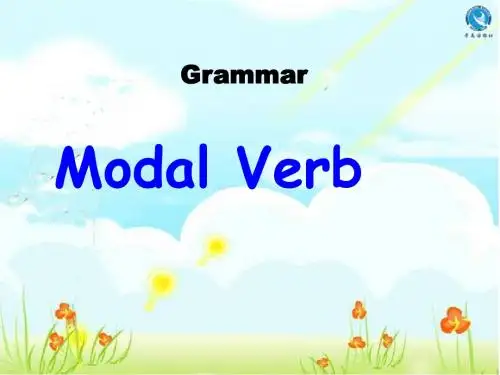
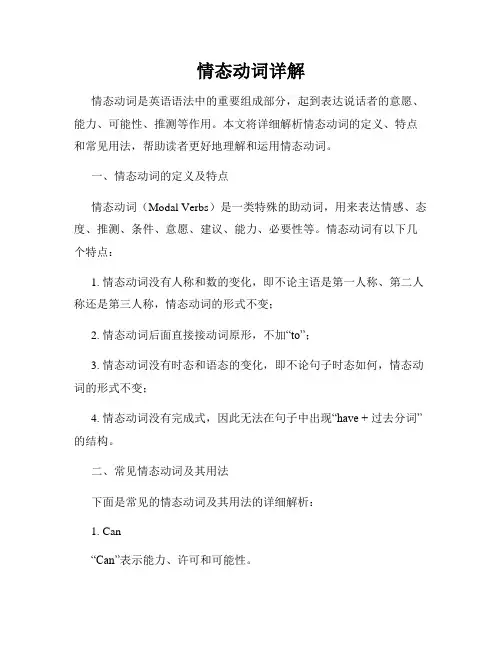
情态动词详解情态动词是英语语法中的重要组成部分,起到表达说话者的意愿、能力、可能性、推测等作用。
本文将详细解析情态动词的定义、特点和常见用法,帮助读者更好地理解和运用情态动词。
一、情态动词的定义及特点情态动词(Modal Verbs)是一类特殊的助动词,用来表达情感、态度、推测、条件、意愿、建议、能力、必要性等。
情态动词有以下几个特点:1. 情态动词没有人称和数的变化,即不论主语是第一人称、第二人称还是第三人称,情态动词的形式不变;2. 情态动词后面直接接动词原形,不加“to”;3. 情态动词没有时态和语态的变化,即不论句子时态如何,情态动词的形式不变;4. 情态动词没有完成式,因此无法在句子中出现“have + 过去分词”的结构。
二、常见情态动词及其用法下面是常见的情态动词及其用法的详细解析:1. Can“Can”表示能力、许可和可能性。
能力:用于表达某人在某方面具有的能力或技能。
例句:He can speak three languages.许可:用于征求或给予许可。
例句:Can I borrow your pen, please?可能性:用于表达可能发生的情况。
例句:It can rain tomorrow.2. Could“Could”是Can的过去式,表示过去或虚拟条件下的能力、许可和可能性。
能力(过去):用于表达过去具备的能力或技能。
例句:When I was young, I could run very fast.许可(过去):用于过去征求或给予许可。
例句:Could I use your phone yesterday?可能性(虚拟条件):用于表示虚拟情况下的可能性。
例句:If I had enough money, I could travel around the world.3. May“May”表示允许、可能性、祝愿和推测。
允许:用于征求或给予许可。
例句:May I come in?可能性:用于表达主观推测的可能性。
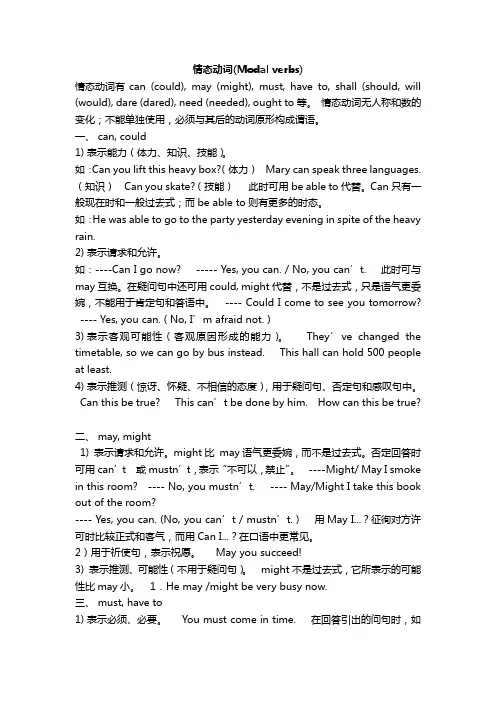
情态动词(Modal verbs)情态动词有can (could), may (might), must, have to, shall (should, will (would), dare (dared), need (needed), ought to等。
情态动词无人称和数的变化;不能单独使用,必须与其后的动词原形构成谓语。
一、can, could1)表示能力(体力、知识、技能)。
如:Can you lift this heavy box?(体力)Mary can speak three languages.(知识)Can you skate?(技能)此时可用be able to代替。
Can只有一般现在时和一般过去式;而be able to则有更多的时态。
如:He was able to go to the party yesterday evening in spite of the heavy rain.2)表示请求和允许。
如:----Can I go now? ----- Yes, you can. / No, you can’t. 此时可与may互换。
在疑问句中还可用could, might代替,不是过去式,只是语气更委婉,不能用于肯定句和答语中。
---- Could I come to see you tomorrow? ---- Yes, you can. ( No, I’m afraid not. )3)表示客观可能性(客观原因形成的能力)。
They’ve changed the timetable, so we can go by bus instead. This hall can hold 500 people at least.4)表示推测(惊讶、怀疑、不相信的态度),用于疑问句、否定句和感叹句中。
Can this be true? This can’t be done by him. How can this be true?二、may, might1) 表示请求和允许。
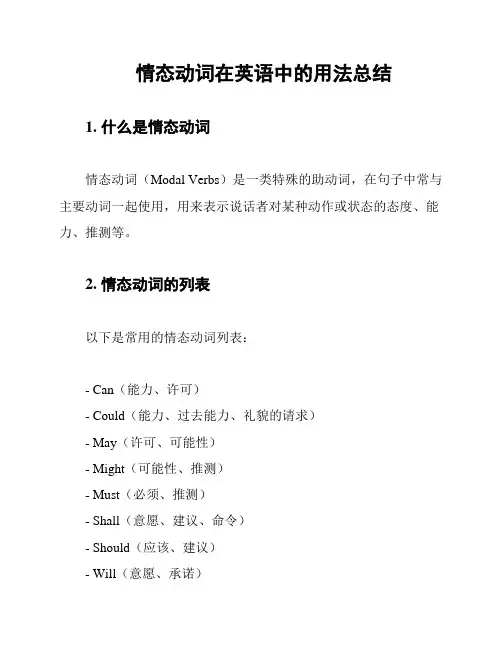
情态动词在英语中的用法总结1. 什么是情态动词情态动词(Modal Verbs)是一类特殊的助动词,在句子中常与主要动词一起使用,用来表示说话者对某种动作或状态的态度、能力、推测等。
2. 情态动词的列表以下是常用的情态动词列表:- Can(能力、许可)- Could(能力、过去能力、礼貌的请求)- May(许可、可能性)- Might(可能性、推测)- Must(必须、推测)- Shall(意愿、建议、命令)- Should(应该、建议)- Will(意愿、承诺)- Would(愿意、过去惯性动作、礼貌的请求)3. 情态动词的用法3.1 表示能力和许可情态动词 can 和 could 用来表示能力,may 和 might 用来表示许可。
例如:- I can swim.(我会游泳。
)- Could you help me with this?(你可以帮我一下吗?)- May I go to the restroom?(我可以去洗手间吗?)3.2 表示可能性和推测情态动词may、might 和could 用来表示可能性和推测。
例如:- It may rain tomorrow.(可能明天会下雨。
)- He might be late for the meeting.(他可能会迟到会议。
)- Could it be true?(这可能是真的吗?)3.3 表示必须和推测情态动词 must 表示必须,而 may 和 might 用来表示推测。
例如:- You must finish your homework.(你必须完成作业。
)- She may have forgotten the appointment.(她可能忘记了约会。
)- It might rain later.(天后可能下雨。
)3.4 表示意愿和建议情态动词 shall、should、will 和 would 用来表示意愿和建议。
例如:- Shall we go to the movies?(我们去看电影好吗?)- You should take a break.(你应该休息一下。
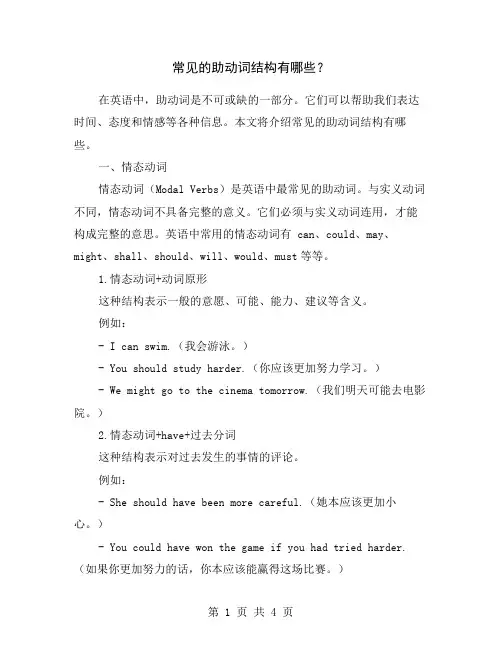
常见的助动词结构有哪些?在英语中,助动词是不可或缺的一部分。
它们可以帮助我们表达时间、态度和情感等各种信息。
本文将介绍常见的助动词结构有哪些。
一、情态动词情态动词(Modal Verbs)是英语中最常见的助动词。
与实义动词不同,情态动词不具备完整的意义。
它们必须与实义动词连用,才能构成完整的意思。
英语中常用的情态动词有 can、could、may、might、shall、should、will、would、must等等。
1.情态动词+动词原形这种结构表示一般的意愿、可能、能力、建议等含义。
例如:- I can swim.(我会游泳。
)- You should study harder.(你应该更加努力学习。
)- We might go to the cinema tomorrow.(我们明天可能去电影院。
)2.情态动词+have+过去分词这种结构表示对过去发生的事情的评论。
例如:- She should have been more careful.(她本应该更加小心。
)- You could have won the game if you had tried harder.(如果你更加努力的话,你本应该能赢得这场比赛。
)3.情态动词+be+现在分词这种结构表示对目前正在进行的事情的推测。
例如:- He must be studying in the library now.(他现在肯定正在图书馆学习。
)- They could be watching TV in the living room.(他们可能正在客厅看电视。
)4.情态动词+have+been+现在分词这种结构表示对过去正在进行的事情的推测。
例如:- She must have been working very hard to finish this project in time.(她肯定非常努力工作才能在时间内完成这个项目。
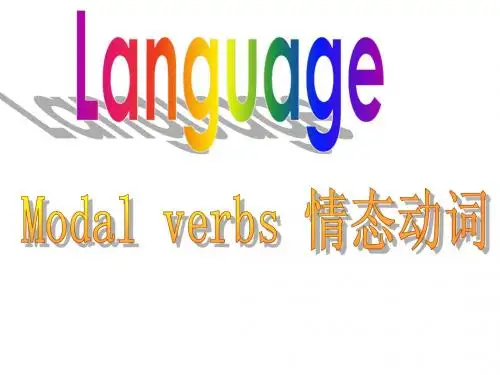
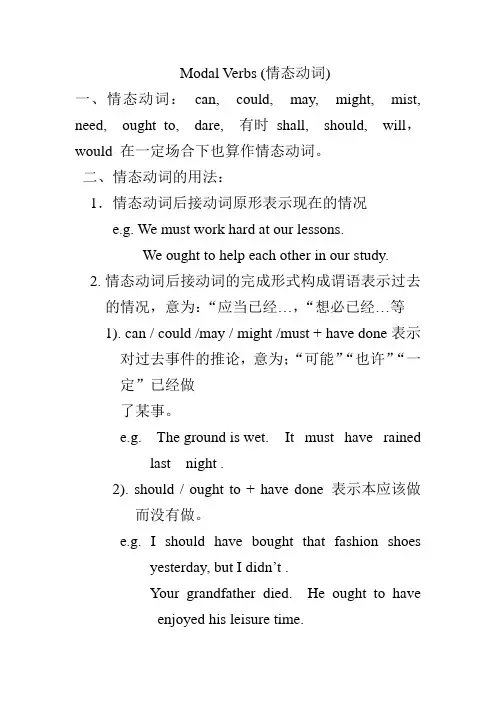
Modal Verbs (情态动词)一、情态动词:can, could, may, might, mist, need, ought to, dare, 有时shall, should, will,would 在一定场合下也算作情态动词。
二、情态动词的用法:1.情态动词后接动词原形表示现在的情况e.g. We must work hard at our lessons.We ought to help each other in our study.2.情态动词后接动词的完成形式构成谓语表示过去的情况,意为:“应当已经…,“想必已经…等1). can / could /may / might /must + have done表示对过去事件的推论,意为;“可能”“也许”“一定”已经做了某事。
e.g. The ground is wet. It must have rainedlast night .2). should / ought to + have done 表示本应该做而没有做。
e.g. I should have bought that fashion shoesyesterday, but I didn’t .Your grandfather died. He ought to haveenjoyed his leisure time.3). should not / ought not to + have done 表示本不该做而做了。
e.g. The man is very clever. He ought not tohave done such a stupid thing.4). needn’ t + have done表示做了不必做的事,意为:“本不必”e.g. You needn’t have bought that coat, we canmake one for you.You needn’t have seen me, I will go backthis afternoon.Exercises (情态动词)1. You are late for work again. You ____have been here an hour earlier.A. shouldB. mayC. mustD. could2. That’ s all right. I can deal with it. You ____ with me.A. don’t need goB. need not go toC. need not goD. need go3. To travel from American to England you must have a passport, but to travel from England to Scotland you ____ .A. mustn’tB. can’tC. don’t haveD. needn’t have4. The house is dark. The Greens ____ to bed.A. must have goneB. should goC. should have goneD. must go5. His English composition is not too good, she ___ itherself.A. can’t have writtenB. won’t have writtenC. mustn’t have writtenD. should have written6. My purse was not found . I ____when I was in a train.A. must dropB. had droppedC. should have droppedD. must have dropped7. They didn’t seem surprised when I told them the news. They ___ about it.A. may have knownB. will have knownC. need have knownD. should have known8. The room is in a terrible mess, it ___ cleaned.A. can’t have beenB. shouldn’t have beenC. mustn’t have beenD. wouldn’t have been9. You ____ the job yesterday. We have a secretaryTo do that kind of thing.A. needn’t have doneB. mustn’t have doneC. should have doneD. can’t have done10. You ___her yesterday. She has been out for two days.A. needn’t have seenB. must have seenC. might have seenD. can’t have seen11. He thought it ___ last night.A. couldn’t rainB. couldn’t have rainedC. mustn’t have rainedD. needn’t have rained12. He ___ at the meeting, but I didn’t notice him there.A. must have beenB. would have beenC. may have beenD. must be13. He hasn’t come yet, he ___ an accident.A. must have beenB. would have beenC. may have beenD. must be14. He ___ be Canadian because he has got a Japanesepassport.A. can’tB. isn’t ableC. mustn’tD. doesn’t15. I was really anxious about you . You __ homewithout a word .A. mustn’t leaveB. shouldn’t have leftC. couldn’t have leftD. needn’t leave16. I am not feeling well in the stomach. I ___ so muchfried chicken just now.A. shouldn’t eatB. mustn’t have eatenC. shouldn’t have eatenD. mustn’t eat17. My English-Chinese dictionary has disappeared.Who ___ have taken it?A. shouldB. mustC. couldD. would18. Mr. White ___at 8:30 for the meeting, but he didn’tShow up.A. should have arrivedB. should arriveC. should have had arrivedD. should be arriving19. __ Tom graduated from college at a very young age.__Oh, he ___have been a very smart boy then.A. couldB. shouldC. mightD. must20. __I will tell Mary about her new job tomorrow.__ You ____her last week.A. ought to tellB. would have toldC. must tellD. should have told。
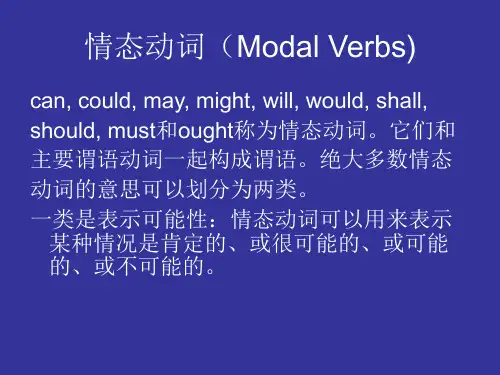
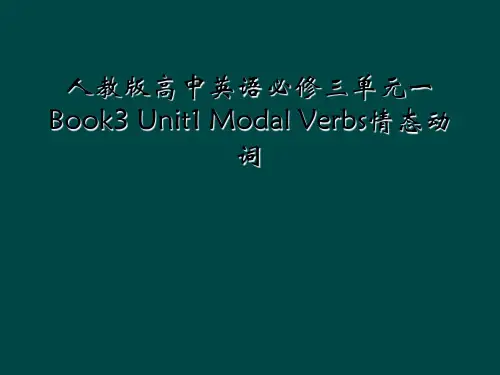
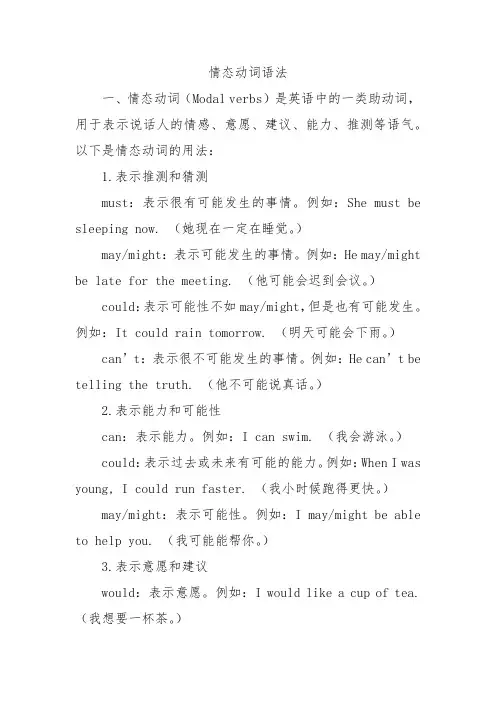
情态动词语法一、情态动词(Modal verbs)是英语中的一类助动词,用于表示说话人的情感、意愿、建议、能力、推测等语气。
以下是情态动词的用法:1.表示推测和猜测must:表示很有可能发生的事情。
例如:She must be sleeping now. (她现在一定在睡觉。
)may/might:表示可能发生的事情。
例如:He may/might be late for the meeting. (他可能会迟到会议。
)could:表示可能性不如may/might,但是也有可能发生。
例如:It could rain tomorrow. (明天可能会下雨。
)can’t:表示很不可能发生的事情。
例如:He can’t be telling the truth. (他不可能说真话。
)2.表示能力和可能性can:表示能力。
例如:I can swim. (我会游泳。
)could:表示过去或未来有可能的能力。
例如:When I was young, I could run faster. (我小时候跑得更快。
)may/might:表示可能性。
例如:I may/might be able to help you. (我可能能帮你。
)3.表示意愿和建议would:表示意愿。
例如:I would like a cup of tea. (我想要一杯茶。
)should:表示应该做的事情。
例如:You should go to see a doctor if you feel sick. (如果你感到不舒服,你应该去看医生。
)4.表示命令和建议must:表示强制性的命令或规定。
例如:You must wear a helmet when riding a bike. (骑自行车时必须戴头盔。
)should:表示建议或推荐。
例如:You should study hard for the exam. (你应该努力学习考试。
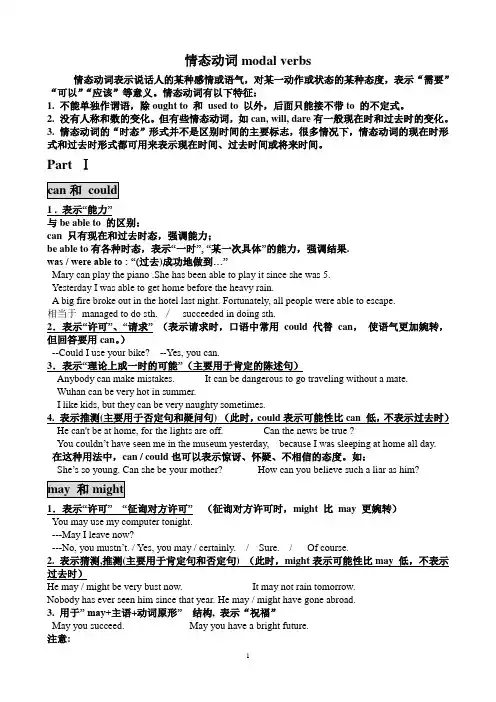
情态动词modal verbs情态动词表示说话人的某种感情或语气,对某一动作或状态的某种态度,表示“需要”“可以”“应该”等意义。
情态动词有以下特征:1. 不能单独作谓语,除ought to 和used to 以外,后面只能接不带to 的不定式。
2. 没有人称和数的变化。
但有些情态动词,如can, will, dare有一般现在时和过去时的变化。
3. 情态动词的“时态”形式并不是区别时间的主要标志,很多情况下,情态动词的现在时形式和过去时形式都可用来表示现在时间、过去时间或将来时间。
PartⅠ1 . 表示“能力”与be able to 的区别:can 只有现在和过去时态,强调能力;be able to有各种时态,表示“一时”, “某一次具体”的能力,强调结果.was / were able to : “(过去)成功地做到…”Mary can play the piano .She has been able to play it since she was 5.Yesterday I was able to get home before the heavy rain.A big fire broke out in the hotel last night. Fortunately, all people were able to escape.相当于managed to do sth. /succeeded in doing sth.2.表示“许可”、“请求”(表示请求时,口语中常用could 代替can,使语气更加婉转,但回答要用can。
)--Could I use your bike? --Yes, you can.3.表示“理论上或一时的可能”(主要用于肯定的陈述句)Anybody can make mistakes. It can be dangerous to go traveling without a mate.Wuhan can be very hot in summer.I like kids, but they can be very naughty sometimes.4. 表示推测(主要用于否定句和疑问句) (此时,could表示可能性比can 低,不表示过去时)He can't be at home, for the lights are off. Can the news be true ?You couldn’t have seen me in the museum yesterday, because I was sleeping at home all day.在这种用法中,can / could也可以表示惊讶、怀疑、不相信的态度。
Modal Verbs情态动词情态动词表示说话的语气或情态。
情态动词本身有词义,但不完全,不能单独作谓语,必须和动词一起构成谓语。
情态动词没有人称和数的变化。
大多数情态动词有过去式。
主要情态动词CanMayWillMustShallNeedDareHad betterWould soonerWould as soonCouldMightWouldHave toShouldOught toUsed toWould rathermight as well情态动词问题解析:may be & maybeMay be (可能是)--- maybe (或许)(副词)The news may be true.Maybe the news is true.She may be waiting for you at home.Maybe she is waiting for you at home.May not & can notmay not 译为“可能不”、“也许不会”而非“不可以”。
“不可以”为must not或can‘t(不许,不可以)。
---May I smoke here?---No, you mustn’t. /you can’t /you can not.The news may not be true.You mustn’t move any of the papers on the desk.Can & be able toBe able to 可以表示更多的时态。
We will be able to finish the work tomorrow.He was not able to realize his greatest ambition.Are you able to design a new computer program?She has not been able to work out the complex problem.ought to的否定式ought to的否定式是ought not to,疑问句只把ought提前。
Unit 1第一部分:Grammar一、情态动词(Modal Verbs)情态动词should 意为“应该,应当”,必须和后面的动词原形一起构成谓语,没有人称和数的变化。
用以表达职责和义务、提出劝告,而且表述的是自己的主观看法。
注意:should 在以why,who,how 等疑问词开头的问句中,意为“竟然,居然,怎么会”,表示意外、惊喜或在说话人看来是不可思议的。
三、反身代词表示反射或强调的代词叫做反身代词。
反身代词是由第一人称、第二人称形容词性物主代词或第三人称代词的宾格形式,词尾加self 或selves 组成。
反身代词可译“本人”、“本身”,为加强语气,也常翻译为“亲自”、“自己”。
不定人称代词one ---- o neself.第二部分:单词用法Section A1.What’s the matter?怎么了?该句常用询问某人患了何种疾病或遇到了什么麻烦,其后用with 引出对象。
1). What’s the matter with sb.?=what’s wrong with sb.?=what’s the trouble/problem with sb.?=what’s one’s trouble/problem?e.g. What’s the matter w ith Tom?=what’s with Tom?=What’s the with Tom?=What’s Tom’s?2). matter, 名词,“问题,事情”e.g. We have important (matter) to discuss.我们有些重要的问题要讨论。
3). 动词,“要紧,关系重大”e.g. It dosen’t that you came late.2.I have a cold. 我感冒了。
1).have/get/catch a cold “感冒,着凉”The old man a cold yesterday.那位老人昨天感冒了。
Grammar— modal verbs一.语法特征:情态动词表示说话人对某一动作或状态的情感和态度。
表示“ 可能、可以、必须、应当”等。
情态动词不能单独做谓语,只能和其他实意动词的原型一起构成谓语,并且无人称和数的变化。
否定式构成是在情态动词后面加not。
个别情态动词有现在式和过去式两种形式,过去式可以用来表达更加客气、委婉的语气,时态性不强,可用于过去、现在或将来。
二.一些常见情态动词的基本用法。
1.can/could表示“能力”、“许可”、“可能性”等。
could可以代替can,表示语气较为委婉。
can 和be able to 都可表示__________, 意思上没有区别,但can 只有______式和______式,而be able to 则有更多的形式。
2. may/might两者都可以表示请求,允许,但might的语气比may委婉;May I use your dictionary?两者都可以表示推测,may比might的可能性大;He may be very busy now.may可用于祈使句,表示祝愿;May you a happy holiday!3. shall【观察】1) Shall she go to the concert with us today?What shall we do this evening?2)You shall go to the front at once.(命令)Don’t worry.You shall get the answer this afternoon.(允诺)He shall be sorry one day.I tell you.(警告)Nothing shall stop us from fighting against pollution. (决心) 归纳:1) shall用于一、三人称疑问句。
用来征求对方意见或向对方请求。
高中英语知识点归纳情态动词和过去完成时的否定和疑问句总结情态动词 (Modal Verbs) 是英语中的一类特殊动词,它们与主动词连用,用来表示说话人的情感、态度、推测、能力、可能性、许可和义务等。
过去完成时 (Past Perfect) 是英语中的一种时态,用来表示在过去某个时间点之前发生或完成的动作。
在本文中,将对情态动词及过去完成时的否定和疑问句进行归纳总结。
一、情态动词 (Modal Verbs)情态动词包括 can、could、may、might、shall、should、will、would、must 等。
它们的用法如下:1. 表示能力和可能性:- Can: 表示能力、许可和推测,用于一般现在时和一般将来时。
例如:"I can swim." (我会游泳。
)- Could: 表示过去的能力、许可和推测,用于一般过去时。
例如:"He could speak English when he was a child." (他小时候会说英语。
) - May: 表示可能性、许可和推测,用于一般现在时和一般将来时。
例如:"It may rain tomorrow." (明天可能会下雨。
)- Might: 表示过去或将来的可能性、许可和推测,用于一般过去时和过去将来时。
例如:"He might be late for the meeting." (他可能会迟到开会。
)2. 表示义务和建议:- Shall: 表示将来的义务和建议。
例如:"Shall I close the door?" (我应该关上门吗?)- Should: 表示现在和将来的义务和建议。
例如:"You should study hard for the exam." (你应该努力学习考试。
)- Must: 表示现在和将来的强制性和肯定性要求。
Modal VerbsCanCan is an auxiliary verb, a modal auxiliary verb. We use can to:∙talk about possibility and ability∙make requests∙ask for or give permissioncan: Possibility and AbilityWe use can to talk about what is possible, what we are able or free to do:∙She can drive a car.∙John can speak Spanish.∙I cannot hear you. (I can't hear you.)∙Can you hear me?Normally, we use can for the present. But it is possible to use can when we make present decisions about future ability.A.Can you help me with my homework? (present)B.Sorry. I'm busy today. But I can help you tomorrow. (future)can: Requests and OrdersWe often use can in a question to ask somebody to do something. This is not a real question - we do not really want to know if the person is able to do something, we want them to do it! The use of can in this way is informal (mainly between friends and family):∙Can you make a cup of coffee, please.∙Can you put the TV on.∙Can you come here a minute.∙Can you be quiet!can: PermissionWe sometimes use can to ask or give permission for something:A.Can I smoke in this room?B.You can't smoke here, but you can smoke in the garden.(Note that we also use could, may, might for permission. The use of can for permission is informal.)CouldCould is an auxiliary verb, a modal auxiliary verb. We use could to: ∙talk about past possibility or ability∙make requestsNotice that:∙Could is invariable. There is only one form of could.∙The main verb is always the bare infinitive.could: Past Possibility or AbilityWe use could to talk about what was possible in the past, what we were able or free to do:∙I could swim when I was 5 years old.∙My grandmother could speak seven languages.∙When we arrived home, we could not open the door. (...couldn't open the door.) ∙Could you understand what he was saying?We use could(positive) and couldn't(negative) for general ability in the past. But when we talk about one special occasion in the past, we use be able to (positive) and couldn't (negative). Look at these examples:could: RequestsWe often use could in a question to ask somebody to do something. The use of could in this way is fairly polite (formal):∙Could you tell me where the bank is, please?∙Could you send me a catalogue, please?Be able toAlthough we look at be able to here, it is not a modal verb. It is simply the verb be plus an adjective (able) followed by the infinitive. We look at be able to here because we sometimes use it instead of can and could. We use be able to:∙to talk about abilityNotice that be able to is possible in all tenses, for example:∙I was able to drive...∙I will be able to drive...∙I have been able to drive...Notice too that be able to has an infinitive form:∙I would like to be able to speak Chinese.be able to: abilityWe use be able to to express ability. "Able" is an adjective meaning: having the power, skill or means to do something. We sometimes use "be able to" instead of "can" or "could" for ability. "Be able to" is possible in all tenses—but "can" is possible only in the present and "could" is possible only in the past for ability. In addition, "can" and "could" have no infinitive form. So we use "be able to" when we want to use other tenses or the infinitive. Look at these examples:∙I have been able to swim since I was five. (present perfect)∙You will be able to speak perfect English very soon. (future simple)∙I would like to be able to fly an airplane. (infinitive)Have to (objective obligation)We often use have to to say that something is obligatory. In general, have to expresses impersonal obligation. The subject of have to is obliged or forced to act by a separate, external power (for example, the Law or school rules). Have to is objective. Look at these examples:∙Children have to go to school.∙In France, you have to drive on the right.∙In England, most schoolchildren have to wear a uniform.∙John has to wear a tie at work.We can use have to in all tenses, and also with modal auxiliaries. We conjugate it just like any other main verb. Here are some examples:Must (subjective obligation)We often use must to say that something is essential or necessary. In general, must expresses personal obligation. Must expresses what the speaker thinks is necessary. Must is subjective. Look at these examples:∙I must go.∙I must stop smoking.∙You must visit us soon.∙He must work harder.In each of the above cases, the "obligation" is the opinion or idea of the person speaking. In fact, it is not a real obligation. It is not imposed from outside.*It is sometimes possible to use "must" for real obligation, for example a rule or a law. But generally we use "have to" for this.We can use must to talk about the present or the future. Look at these examples:∙I must go now. (present)∙I must call my mother tomorrow. (future)There is no past tense for must. We use have to to talk about the past.Must not (prohibition)We use must not to say that something is not permitted or allowed. Must not expresses prohibition - something that is not permitted, not allowed. The prohibition can be subjective (the speaker's opinion) or objective (a real law or rule). Must not is often contracted to mustn't. Look at these examples:∙Passengers must not talk to the driver.∙I mustn't eat so much sugar. (subjective)∙You mustn't watch so much television. (subjective)∙Students must not leave bicycles here. (objective)∙Policemen must not drink on duty. (objective)We use must not to talk about the present or the future:∙Visitors must not smoke. (present)∙I mustn't forget Tara's birthday. (future)We cannot use must not for the past. We use another structure to talk about the past, for example:∙We were not allowed to enter.∙I couldn't park outside the shop.Shall and WillPeople may sometimes tell you that there is no difference between shall and will, or even that today nobody uses shall(except in offers such as "Shall I call a taxi?"). This is not really true. The difference between shall and will is often hidden by the fact that we usually contract them in speaking with 'll. But the difference does exist.The truth is that there are two conjugations for the verb will:It is true that this difference is not universally recognized. However, let those who make assertions such as "Americans never use 'shall'" peruse a good American English dictionary, or many American legal documents, which often contain phrases such as:∙Each party shall give one month's notice in writing in the event of termination.Note that exactly the same rule applies in the case of should and would. It is perfectly normal, and somewhat more elegant, to write, for example:∙I should be grateful if you would kindly send me your latest catalogue.。